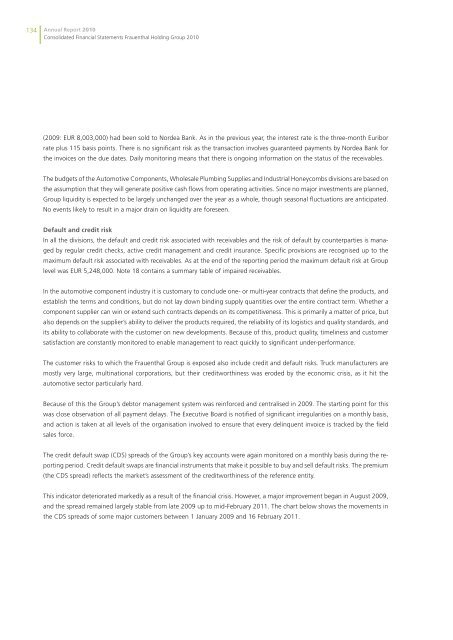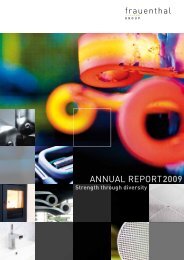Annual Report 2010 - Frauenthal Holding AG
Annual Report 2010 - Frauenthal Holding AG
Annual Report 2010 - Frauenthal Holding AG
Create successful ePaper yourself
Turn your PDF publications into a flip-book with our unique Google optimized e-Paper software.
134 <strong>Annual</strong> <strong>Report</strong> <strong>2010</strong><br />
Consolidated Financial Statements <strong>Frauenthal</strong> <strong>Holding</strong> Group <strong>2010</strong><br />
(2009: EUR 8,003,000) had been sold to Nordea Bank. As in the previous year, the interest rate is the three-month Euribor<br />
rate plus 115 basis points. There is no significant risk as the transaction involves guaranteed payments by Nordea Bank for<br />
the invoices on the due dates. Daily monitoring means that there is ongoing information on the status of the receivables.<br />
The budgets of the Automotive Components, Wholesale Plumbing Supplies and Industrial Honeycombs divisions are based on<br />
the assumption that they will generate positive cash flows from operating activities. Since no major investments are planned,<br />
Group liquidity is expected to be largely unchanged over the year as a whole, though seasonal fluctuations are anticipated.<br />
No events likely to result in a major drain on liquidity are foreseen.<br />
Default and credit risk<br />
In all the divisions, the default and credit risk associated with receivables and the risk of default by counterparties is managed<br />
by regular credit checks, active credit management and credit insurance. Specific provisions are recognised up to the<br />
maximum default risk associated with receivables. As at the end of the reporting period the maximum default risk at Group<br />
level was EUR 5,248,000. Note 18 contains a summary table of impaired receivables.<br />
In the automotive component industry it is customary to conclude one- or multi-year contracts that define the products, and<br />
establish the terms and conditions, but do not lay down binding supply quantities over the entire contract term. Whether a<br />
component supplier can win or extend such contracts depends on its competitiveness. This is primarily a matter of price, but<br />
also depends on the supplier’s ability to deliver the products required, the reliability of its logistics and quality standards, and<br />
its ability to collaborate with the customer on new developments. Because of this, product quality, timeliness and customer<br />
satisfaction are constantly monitored to enable management to react quickly to significant under-performance.<br />
The customer risks to which the <strong>Frauenthal</strong> Group is exposed also include credit and default risks. Truck manufacturers are<br />
mostly very large, multinational corporations, but their creditworthiness was eroded by the economic crisis, as it hit the<br />
automotive sector particularly hard.<br />
Because of this the Group’s debtor management system was reinforced and centralised in 2009. The starting point for this<br />
was close observation of all payment delays. The Executive Board is notified of significant irregularities on a monthly basis,<br />
and action is taken at all levels of the organisation involved to ensure that every delinquent invoice is tracked by the field<br />
sales force.<br />
The credit default swap (CDS) spreads of the Group’s key accounts were again monitored on a monthly basis during the reporting<br />
period. Credit default swaps are financial instruments that make it possible to buy and sell default risks. The premium<br />
(the CDS spread) reflects the market’s assessment of the creditworthiness of the reference entity.<br />
This indicator deteriorated markedly as a result of the financial crisis. However, a major improvement began in August 2009,<br />
and the spread remained largely stable from late 2009 up to mid-February 2011. The chart below shows the movements in<br />
the CDS spreads of some major customers between 1 January 2009 and 16 February 2011.




